How to make concrete yourself: proportions, mixing and
Nowadays, the popularity of self-manufacturing concrete has begun to grow. If the material is prepared correctly, it is not inferior in anything to marble or granite. Given the more affordable cost of its manufacture, developers often prefer hand-made concrete to purchase.
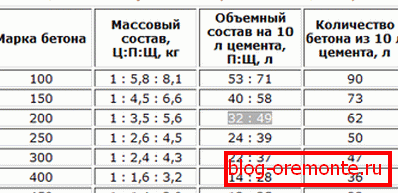
Main components
The process of making with your own hands is not as difficult as it may seem at first glance.
In this article we will describe the proportion in which concrete is kneaded, but before starting to work, it is necessary to prepare:
- sand, preferably without impurities;
- cement, the best Portland cement M400 or M500;
- crushed stone for concrete, the fraction depends on the construction site (large for the foundation, medium and small - for other structures);
- clean water (it is better not to use rainwater);
- various additives with which you can give the material the desired characteristics.
Tip: if you want to minimize the final cost estimate, you should know in advance where you can find the most accessible materials.
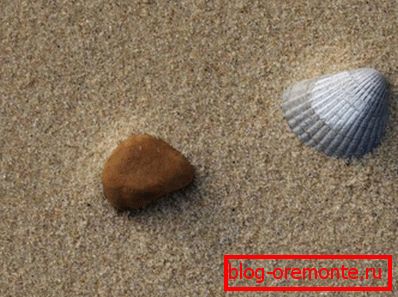
| Sand | Важно помнить, что не допускается большое процентное содержание в его составе различных примесей (глины и т.п.). Если приводить в пример ГОСТ, то характеристики взятого песка должны совпадать со свойствами песка первого класса (процент примесей не более 1%, коэффициент фильтрации 5-7м/сут). Sand, добытый с рек и морей, практически полностью соответствует данным предписаниям. А вот карьерный песок специалисты использовать не рекомендуют. Дело в том, что он имеет достаточно большое количество загрязнений, что негативно может повлиять на качество полученного бетона. Но, так как цена его добычи очень низкая, он очень часто применяется в частном строительстве.Для проверки пригодности можете провести небольшой эксперимент:
|
| Rubble | The material is obtained by crushing hard rocks. Since its edges have a rough, jagged surface, it serves to bond the mortar. The size of the fraction should be in the range from 5 to 20 mm. |
| Cement | A direct factor that has a direct impact on the strength characteristics of concrete is the cement grade. 500 is most often used, 400 grade cement is also allowed. The figure (in MPa) indicates how strong concrete will be after 4 weeks of hardening. It is worth remembering that cement for concrete it must be fresh, because its long-term storage has a negative effect on the strength characteristics, which deteriorate by 10% every month. Especially important is the use of fresh cement when laying the foundation, as it is the foundation of the building. |
| Water | The composition should be as pure as possible - without bleaching powder, various oils, and other additives. Normal binding occurs at a percentage water content of about 20% by weight of the solution. If you use too much of it, this may cause a decrease in the strength characteristics of the material. This is due to the evaporation of the liquid, which leads to the formation of voids inside the concrete. |
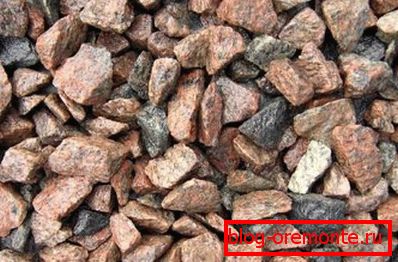
Proportions
In order to obtain truly high-quality concrete made on its own, it is necessary that the ratios between the ingredients be strictly observed. Below, we use an illustrative example to figure out how much material is needed in order for our material grade to match B20 properties. Here are the proportions - how to make concrete from cement, sand and rubble: 1x2,6x4,5.
This means that to get 1 m3 of the finished mixture, we need:
- 315 kg of cement grade M500;
- 850 kg of sand;
- 1050 kg of rubble.
In addition, for each cubic meter of concrete consumed about 125 liters of water.
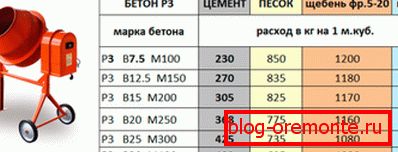
Tip: do not experiment and violate the proportions. Only their strict observance will help to get a quality mixture.
Kneading
An inexperienced person may find that self-mixing concrete is not associated with special difficulties, but this is not the case. Those who did this know that cement, dissolving in water, often forms lumps, which greatly complicate the process.
To avoid their appearance, the following instructions are provided:
- Prepare a dry container and pour the necessary amount of cement into it..
- Add sand, then stir the mixture until a homogeneous consistency.
- Pour water and mix thoroughly..
- Add rubble and mix.
Manually concrete can be made, but only in small quantities. The simplest option would be to use a special concrete mixer - a concrete mixer. The most affordable models start at 10 thousand rubles.
In any case, you will have to resort to the services of such machines when you need a large amount of work (for example, a floor screed). In this case, independent mixing the mixture becomes impractical.
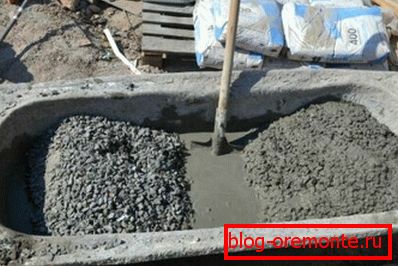
For those who are not ready to part with such money, and even rarely make concrete, the entire manufacturing process can be carried out in a trough, an old bathroom, etc. Stir in this case with a spade.
Although you save a lot of money, you will spend a lot of time and effort. Moreover, this method is quite inconvenient.

Dye
So, you have a fairly high-quality concrete. But at once it is worth noting that its appearance can not be called aesthetic. Therefore, I propose to dwell on the issue of creating a dye for it.
For this we need the coloring pigment. Most often in his role acts acid dye. Gel-type materials are used to prevent liquid from flowing through the walls.
For self-made dye manufacturing it is necessary to prepare:
- solvent,
- adhesive;
- any pigment in color;
- additives with which the result is fixed.
It is necessary to place all the listed components in a vessel and mix until the resulting mass becomes gel-like. To give concrete color, you will need to add a certain pigment. After this, treat the concrete base with a solvent and after it has dried it can be painted.
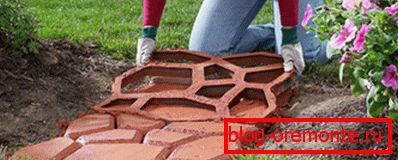
At the same time, remember that the construction market offers a not too wide range of dyes. Therefore, to obtain a certain color, you will most likely need to mix different colors with each other.
Tip: if you work with acidic dyes, you need to take care of your protection.
Conclusion
From this material you have learned what proportions of concrete will be correct in its manufacture. Experts strongly recommend not to violate them, otherwise the final result will disappoint you. The video in this article will help you find additional information on this topic.